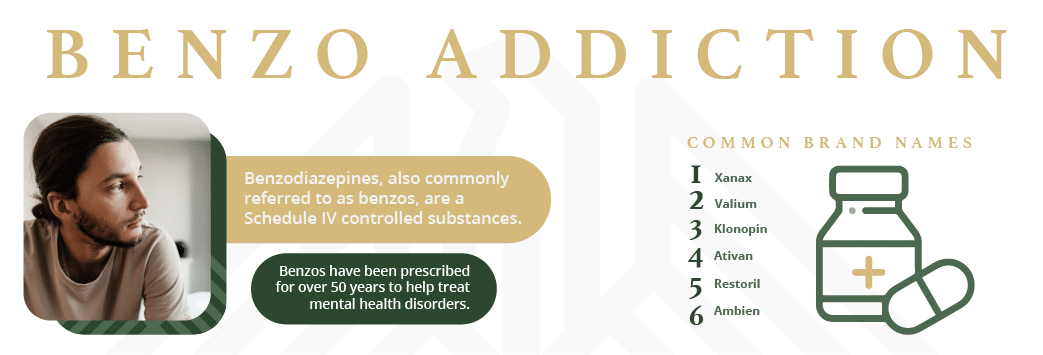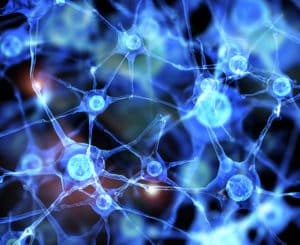Benzo Addiction Treatment in Idaho
Benzodiazepines are a type of drug that is often used to treat anxiety and panic attacks linked with panic disorder. It is widely acknowledged that benzodiazepines can be physically and mentally addictive. However, the degree of the problem among users who take these drugs only for therapeutic purposes in the treatment of anxiety is debatable.
To have a better understanding of the dependency hazards associated with benzodiazepine usage, it is necessary to distinguish between benzodiazepine dependence and benzodiazepine addiction. Is physical dependency on benzodiazepines synonymous with addiction? Is it a sign of addiction if withdrawal symptoms develop after discontinuing a benzodiazepine?
While much of the attention over the past several years has been centered around opioids and opioid abuse, the rate at which people abuse benzodiazepines has been on the rise.
Benzodiazepines do serve a valuable medical purpose, they are also often taken in ways other than directed. With Benzo abuse and addiction on the rise, it is important to know the warning signs of Benzo abuse and addiction so you or a loved one can receive Benzo addiction treatment.
At Eagle Creek Ranch Recovery in Nampa, Idaho, our Benzo addiction treatment center can help you or a loved one suffering from drug abuse break the cycle of addiction and recover long-term.

Benzodiazepine tranquilizers, also known as “benzos,” are CNS (Central Nervous System) depressants. Benzos are widely given for anxiety disorders, sleeplessness, and seizures due to their effectiveness in reducing both physical and emotional strain. In other words, they’re depressants that help slow down a person’s central nervous system.
Unfortunately, many people become addicted to these medicines. Benzodiazepine addiction is a significant component of the American drug pandemic. Because these medicines are so addictive, annual overdose deaths involving benzos increased year after year during the first decade of the twenty-first century. Valium, Xanax, Ativan, Rohypnol, and Klonopin are among the most addictive benzodiazepines.
Benzos have been medically prescribed for over 50 years to help treat conditions such as anxiety, depression, panic disorder, insomnia, muscle spasms, and seizures. In some cases, benzos are even given to a person before the anesthesia is administered during surgery to calm their nerves.
Common brand names of benzodiazepines include:
- Xanax
- Valium
- Klonopin
- Ativan
- Restoril
- Ambien
Due to their powerful side effects, benzodiazepines can become highly addictive. Without professional help at a Benzo addiction treatment center, substance abuse can take over all aspects of one’s life, and cause major health complications, mentally and physically.
How Do Benzos Work?
 Medically speaking, benzodiazepines are Schedule IV controlled substances. Benzos suppresses neuron activity and, by extension, anxiety and muscle spasms via attaching to the brain’s GABA (gamma-aminobutyric acid) neurotransmitter receptors. This is what produces the calming and relaxation effects that someone feels after they have taken this type of drug.
Medically speaking, benzodiazepines are Schedule IV controlled substances. Benzos suppresses neuron activity and, by extension, anxiety and muscle spasms via attaching to the brain’s GABA (gamma-aminobutyric acid) neurotransmitter receptors. This is what produces the calming and relaxation effects that someone feels after they have taken this type of drug.
In other words, benzos are a central nervous system depressant, meaning they depress or slow down the body and brain’s central nervous system. This drug classification also applies to substances such as alcohol.
While those taking benzos to treat a medical condition might feel more “normal” when they take it, those who abuse benzos or take them in ways other than medically directed benzos can produce feelings of intense relaxation, pleasure, and euphoria.
Types of Benzodiazepines
Ultra-short-acting medicines have the quickest onset of action and are used to treat insomnia or as part of a pre-surgical anesthetic. Midazolam (Versed) and triazolam (Halcion) are two examples.
Short-acting medications have quick but relatively short-lasting action. Alprazolam (Xanax) and lorazepam (Ativan) are two examples of anti-anxiety medications.
Long-acting medications provide long-term treatment by slowly releasing active components. They include chlordiazepoxide (Librium) and diazepam (Valium), which are commonly used for anxiety, seizures, and insomnia.
Benzodiazepine Dependency vs Benzodiazepine Addiction
Drug addiction is distinct from drug dependency, according to the American Society of Addiction Medicine. Not everyone who has a physical need for a drug will develop an addiction. It is thought that certain people are predisposed or sensitive to addiction due to biological, psychological, and social factors.
If a drug is abruptly stopped or reduced, withdrawal symptoms can be used to identify physical dependence. While physical dependency is a component of addiction, it is not addiction in and of itself. Many drugs might cause physical dependence.
Certain blood pressure drugs, for example, might lead to physical dependence. However, these drugs do not cause addiction. Physical dependency may be an expected side effect of long-term benzodiazepine therapy.
If a person is physically reliant on a benzodiazepine, drug, and alcohol withdrawal issues can be avoided by gradually lowering the prescription dosage over time.
Drug addiction is a brain illness characterized by physical and psychological reliance. Detoxification may result in the cessation of physical dependence, but the psychological component retains a firm grip on the addict. This factor makes it difficult for sufferers to sustain sober. There is no cure for addiction, and staying sober is frequently a continuing struggle for people who suffer from it.
Drug addiction leads to drug-seeking behaviors and continued usage in the face of unfavorable consequences. Benzodiazepine-seeking activities may involve receiving the drug from multiple providers or unlawfully obtaining the drug without a doctor’s prescription.
Addiction to benzodiazepines or other substances can hurt many aspects of one’s life. These effects may include decreased productivity at work, family or relationship concerns, or legal issues. Drug addiction occurs when a person continues to take a drug despite the negative repercussions.
Drug addiction symptoms may include:
- Medicine-seeking activities (acquiring medicine from several doctors, obtaining the drug illegally)
- The desire for a substance
- Obsession with receiving the drug
- Misusing the substance for intoxication or recreational purposes
- Withdrawal and dependence after discontinuing the drug
- Interference with regular life functions (lower productivity, lower motivation)
- Relationship issues
- Concerns about the law
- Despite unfavorable consequences, use continues
It is crucial to note that, when used as indicated, benzodiazepines are generally safe and effective. Long-term use may result in tolerance and reliance, which is to be expected. However, this is not the same as addiction. If you believe you have an addiction, keep in mind that assistance is accessible. Discuss treatment choices with your doctor or other healthcare experts.
Why are Benzos Addictive?
What makes benzos so highly addictive is that the body and brain quickly build up a tolerance, requiring larger doses to achieve the same effect. Regular use of benzos teaches the body to depend on outside means for relaxing, so patients become increasingly tense and irritable in the absence of frequent doses, and increasingly dependent psychologically on this easy means of stress relief. Also, most Benzo use involves prescribable medications, and it’s psychologically easier to rationalize the abuse of a doctor-approved drug.
The medical system itself has helped encourage benzo addiction by being too quick to offer an easy solution to tough problems. Benzos are a traditional first-line treatment for anxiety disorders in particular, and as many as 150 million prescriptions have been issued in some years.
Similar to opioids and other highly addictive illicit substances, benzos create a surge of dopamine levels. Dopamine is the chemical in the brain that is responsible for feelings of pleasure and euphoria.
While normally, the brain would regulate dopamine levels on its own, when benzos enter the system the brain loses the ability to control the release of these dopamine levels and the amount of dopamine that is released. Over time, the brain not only becomes reliant on the benzos to handle the release of dopamine, but it also becomes dependent on the higher dopamine levels that the benzos produce. When the brain thinks that it can no longer function properly without these elevated dopamine levels, it means that it is addicted to Benzos.
Because of the hazards, doctors normally prescribe benzos for short-term usage (no more than three or four months), although psychological desires for greater tension reduction can develop early on. Many people overdose on medicines based on their discretion, dangerously boosting their tolerance levels and pushing their bodies toward physical addiction. When cravings grow overwhelming, addicts look for ways to obtain more medication than is authorized by the original prescriptions, often for years.
Overuse of prescriptions for rapid relief has also resulted in widespread abuse of opioids, another pharmaceutical group with relaxant effects that are often utilized in pain-relief treatments. Although the Food and Drug Administration (FDA) warns that this is dangerous, the FDA now requires that drug labeling for both benzo and opioid products describe the risks, which include difficulty breathing, extreme sleepiness, and potentially fatal coma.
Signs and Symptoms of Benzodiazepine Misuse
While many people take benzos for the calming and euphoric effects, abusing benzos can lead to many unwanted side effects and symptoms including:
- Confusion
- Increased anxiety
- Drowsiness
- Lightheadedness
- Restlessness
- Insomnia
- Nausea
- Dry mouth
- Blurry vision
- Impaired judgment
- Headaches
- Changes in eating patterns
- Slurred speech
- Memory issues
- Constipation
- Dizziness
- Difficult breathing
- Suicidal thoughts or actions
In addition to these side effects, if you suspect or fear that a loved one might be suffering from benzodiazepine abuse or addiction, certain behavioral patterns can tip you off including:
- Lying about their benzo use
- Finding empty bottles or drug paraphernalia hidden
- Withdrawing from friends and family
- Ignoring obligations or responsibilities
- Getting into financial trouble as a result of their benzo use
- Engaging in risky activity while under the influence
- Losing interest in activities
- Noticeable changes in mood
- Noticeable changes in personal hygiene
- “Doctor shopping”
Contact Eagle Creek Ranch
Recovery Today!
Why Wait? Find The Help You Need By Reaching Out To Us Today! Our Admissions Team Is Standing By.
Causes of Benzodiazepine Abuse

While taking benzos don’t automatically mean that you will develop a substance abuse problem. However, certain risk factors can cause you or someone you know to develop an addiction problem.
Below are some of the causes and risk factors associated with benzodiazepine abuse:
- Gender – Females are 37% more likely to develop a Benzo addiction than males
- Age – People between the ages of 18-25 are more likely to sue and abuse Benzos recreationally
- Duration – If you take Benzos for more than 6 months, even if medically prescribed, you increase the risk of dependency and addiction
- Genetics – Those who have addiction run in their immediate family are more likely to develop a substance abuse issue themselves
- Environment – Those who grew up around substance abuse, addiction, violence, or experienced trauma at a young age are more likely to develop a substance abuse issue
- Experimentation – Those who experiment with drugs or alcohol, especially at a younger age are more likely to develop a substance abuse problem.
Effects of Benzodiazepine Addiction
Short term, when you take benzos you might notice some enjoyable effects such as:
- Anxiety relief
- Sedation
- Relaxation
It’s these enjoyable effects that keep you taking more and more. However, over time these effects can go from enjoyable to not-so-enjoyable and even dangerous.
Long-term, prolonged benzo use can lead to:
- Self-harm
- Inability to keep or get a job
- Relationship problems
- Physical and mental health problems
- Legal trouble
- Using other substances for abuse
- Cognitive dysfunction
- Financial problems
- Chronic absenteeism
When Might I Experience Withdrawal Symptoms From Benzodiazepines?
Withdrawal symptoms may appear several hours after stopping the use of a short-acting benzodiazepine. They may also appear up to three weeks after discontinuing a long-acting benzodiazepine. This is because long-acting benzodiazepines can remain active in your system after you stop taking them.
If you have benzodiazepine withdrawal symptoms, you may encounter some of the following:
- Cramping in the abdomen
- Agoraphobia (the fear of being trapped in situations from which it is difficult to escape)
- Anxiety manifests itself physically as muscle tightness, tight chest, rapid heartbeat, perspiration, trembling, or shaking.
- Vision distortion
- Difficulties concentrating
- Dizziness
- Headaches
- Heightened sensitivity to light, sound, touch, and smell
- Loss of sexual interest
- Appetite loss
- Mild to medium depression
- Nausea
- Nightmares
- Anxiety attacks
- Restlessness
- Sleep issues
- Achy eyes
- Tinnitus (Ringing in the ears)
- Pins and needles sensation in the hands and feet
Benzodiazepines may also cause more severe withdrawal symptoms. These could include:
- Hallucinations
- Memory loss
- Twitching muscles
- Seizures caused by paranoia
- Confusion
- Psychosis
- Seizures
- Racing heart
- High blood pressure (Hypertension)
- Tremors (shaking)
- Hallucinations
The longer you take benzodiazepines, the more difficult it is to stop and the greater your risk of withdrawal symptoms. If you have been using short-acting benzodiazepines for a long time, they can be very difficult to discontinue.
The Connection Between Mental Illness and Benzo Addiction
As is the case with many other substances of abuse, many people turn to benzos as a way to deal with other issues going on in their life. They might be struggling mentally and instead of seeking professional help, they turn to drugs or alcohol as a way of self-medicating so that they can feel better.
While in the short term, this might seem like an effective strategy, long-term this can not only lead to more mental health issues, but it can also lead to dependency and addiction and the physical ailments that come with that as well. This is known as dual diagnosis or co-occurring disorders.
Co-Occurring Disorders
Some of the most common mental health conditions that are associated with benzodiazepine abuse include:
- Generalized anxiety disorder (GAD)
- Post-traumatic stress disorder (PTSD)
- Depression
- Bipolar disorder
- Schizophrenia
- Other substance abuse issues
In some situations, benzo abuse and addiction can trigger mental health issues that might not have existed. Benzodiazepine addiction can cause the chemical makeup of the brain to change which can ultimately lead to the development of a new mental health condition.
Benzodiazepine Detox

If you or a loved one is looking to seek treatment for benzo dependency or addiction, the first step in that process is to undergo a benzodiazepine detox. The medical detox process is done to rid the brain and body of all harmful substances so that the body and brain can begin to heal.
Due to the nature of detoxing and the withdrawal symptoms associated with it, this process should be done under the care and supervision of trained medical professionals. This can be done at a local medical facility, a dedicated detox center, or a treatment center that also offers detox services such as Eagle Creek Ranch Recovery. Self-detox can be dangerous, potentially life-threatening, and can increase the risk of relapse.
Some symptoms associated with benzo withdrawal include:
- Weight loss
- Vomiting
- Muscle spasms
- Body aches
- Insomnia
- Panic attacks
- Hallucinations
- Cognitive problems
- Anxiety attacks
- Hyperventilation
- Suicidal thoughts
During the medical detox process, especially early on, you might be given medications to help alleviate some of these withdrawal symptoms.
How Can I safely Discontinue the Use of Benzodiazepines?
If at all feasible, reduce your dose gradually after discontinuing benzodiazepines. This lowers the likelihood of having withdrawal symptoms.
Your doctor can provide you with more precise instructions on how to properly discontinue your medication. You may also find it beneficial to discuss your withdrawal with others. This could come via a local or online support group, or from friends and family.
Benzodiazepine Addiction Treatment
Once detox has been completed, the next step is to begin treatment with either an inpatient or outpatient program. Your treatment professional will recommend a treatment plan and program for you based on a variety of factors including the severity of one’s benzodiazepine addiction and if you can enter into an inpatient program.
During treatment for Benzo’s addiction, you will participate in a variety of different therapies to help treat your addiction. Therapy has been proven to be one of the more effective ways to treat substance abuse and addiction and any underlying mental health conditions you might be dealing with.
Your treatment professional will create a custom treatment plan for you based on your needs. At Eagle Creek Ranch Recovery, we offer a variety of different therapies including:
- Individual therapy
- Group therapy
- Family therapy
- Cognitive-behavioral therapy (CBT)
- Dialectical behavior therapy
- Adventure therapy
- Equine therapy
Receive Help at Our Drug Rehab in Idaho
While benzodiazepines do have many important medical uses, they also have a tendency to be used and abused in ways other than directed. This can lead to addiction. Even if you are medically prescribed Benzos, there is a risk of an addiction developing, especially if you take them for a long time.
Whether you have taken benzos medically or recreationally if you have developed a benzo abuse or addiction problem it is important to get help right away.
At Eagle Creek Ranch Recovery in Idaho, we understand the importance of treatment for all different types of substances of abuse. That’s why we offer a wide variety of treatment programs for not just Benzo’s addiction but other substances of abuse as well including alcohol, cocaine, heroin, and others.
If you or someone you know is struggling with addiction and needs treatment, contact us today.

Clinical Director
Kendall Maloof is the clinical director at Eagle Creek Ranch Recovery. She is a licensed marriage and family therapist and has held multiple leadership roles before settling here at Eagle Creek. Kendall received her master’s degree in marriage and family therapy from the Chicago School of Professional Psychology in 2016. Her career in mental and behavioral health began in 2014 when she took up internships in both the nonprofit and for profit sectors. She interned at multiple reputable companies, such as The Living Success Center and 449 Recovery in California.
In 2019, Kendall became the clinical director of Sunsets Recovery for Woman, a dual diagnosis program in southern California. Kendall is a natural leader. She has an incredible ability to problem solve and stay calm in any situation. Kendall never fails to show up when she is needed, and her calm demeanor makes her team and clients feel at ease. Eagle Creek Ranch Recovery is proud to have Kendall as our clinical director.


